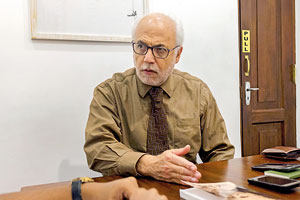Sunday Times 2
Trump is the product of capitalism’s failure, says US socialist leader
After the fall of the Soviet U nion and the general decline in socialist politics at the end of the last century, many people wondered if perhaps socialism was too utopian and its application bound to result in Stalinist and Maoist type regimes. For most people today, there exists little or no difference between the politics of people like Josef Stalin, Fidel Castro and Mao Zedong, and the writings of Karl Marx and Friedrich Engels.

David North: Democracy could be achieved only with a transfer of power to the working class
The Sunday Times met with David North, the leader of the Socialist Equality Party (SEP) of the United States, recently for an interview on the relevance and role of socialism in today’s world. The SEP is a Trotskyist party which is the American arm of the International Committee of the Fourth International.
North began by defining socialism in its most basic form as that of the ‘equality of all people’ and then moved on to clarify many of the misconceptions surrounding it. He emphasised the importance of viewing issues in the context of their history, which is the basis of the Marxist methodology for analysing social, political and economic problems.
“The twentieth century was the most revolutionary in history, with the central event being the October Revolution in Russia which established for the first time in history a workers’ state. And yet, at the end of that century it appeared that socialism was finished. The answer to this however is to be found in a study of the political struggles within the working class movement internationally,” he said. “And out of all those struggles none is more fundamental, critical, and decisive in understanding the world we live in today, than the struggle led by Leon Trotsky against Stalin and the politics of the Soviet Union.”
He said that ‘socialism in one country’, the theory espoused by Stalin, was the antithesis of Marx and Engel’s writings and what Vladimir Lenin, the father of the Russian Revolution, himself believed in. “Trotsky and Lenin were on the same page on this. If you read Trotsky’s Revolution Betrayed (1936) you will see how Trotsky predicted that the Stalinist policies of socialism in one country which were bureaucratic, would lead to the demise of the Union, 55 years before it actually fell.”
North and the SEP naturally subscribe to Trotsky’s theory of an international ‘permanent revolution’, which states that, in order for socialism to sustain globally, it is required that the working class in all countries carry out the struggle against their different patriarchal social structures, and stand in solidarity with one another.
He then moved on to explain the formation of the SEP from its precedent party, the Workers’ League, which in turn split from the Socialist Workers’ Party (SWP) in the late sixties. The split from the SWP was influenced by events in Cuba and Sri Lanka.
“We pulled out of the Workers’ Party in a fight against the latter’s embrace of the Castro regime, which was anti-Marxian. But it was also influenced by events in Sri Lanka following the Lanka Sama Samaja Party’s (LSSP) entrance into the coalition government with the Sri Lanka Freedom Party. Our faction opposed this very opportunistic move made by the LSSP and then the LSSP was expelled from the Fourth International.”
Talking about the present global political scene and the rise of right-wing populism as well as the pseudo-liberal left, North said that these were not an accident, but the product of the systematic failures of capitalism. “Donald Trump is the summit of this failure and a symptom of a deeper disease,” he said. “The right-wing seeks to exploit the dissatisfaction of the masses with demagoguery. Meanwhile, the pseudo-left is engaged in identity politics. Right now you are being told that the real divisions are racial divisions, sexual divisions, gender divisions and so on. These are in fact not the fundamental divisions. The fundamental divisions are class divisions. It would be ludicrous to think that a working class woman has more in common with Hilary Clinton than a fellow working class man. The reason the right wing is able to exploit the crisis is because the pseudo-left has long ignored the working class and their issues.”
He stressed the need for a change in the system to overcome these problems, where democracy could be achieved only with a transfer of power to the working class and an abolition of private ownership of the means of production.
He concluded with some thoughts on the situation in Sri Lanka, and the role of the Sri Lankan SEP headed by its General Secretary Wije Dias.
“Prior to the 2015 Presidential Election, much of the left was in praise of Maithripala Sirisena and said that if he became president it would be a wonderful advance over Mahinda Rajapaksa. But the SEP rejected this, and warned that it would not represent a progressive change. This has now been confirmed,” he said.
North said that the JVP and the Frontline Socialist Party which holds a monopoly over student leftist politics, are bitterly anti-Trotskyist and align themselves with nationalist ideas, appealing to segments of the middle-class. He said the Sri Lankan SEP would never consider aligning itself with the now degenerate Marxist parties which had more in common with Castroism than Marxism. Instead the role of the SEP would be to continue to educate the people in what the real issues of society were and to raise what Marx termed “class-consciousness.”

